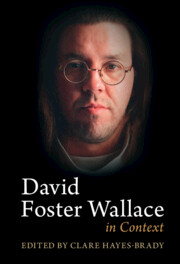Book contents
- David Foster Wallace in Context
- David Foster Wallace in Context
- Copyright page
- Contents
- Figures
- Contributors
- Acknowledgments
- Abbreviations
- Introduction
- Part I Contexts
- Part II Ideas
- Part III Bodies
- Part IV Systems
- Chapter 26 Infinite Jest as Opiate Fiction
- Chapter 27 David Foster Wallace and Racial Capitalism
- Chapter 28 Language and Self-Creation
- Chapter 29 Very Old Land
- Chapter 30 David Foster Wallace’s Ecologies
- Chapter 31 “I Could, If You’d Let Me, Talk and Talk”
- Chapter 32 David and Dutch
- Chapter 33 David Foster Wallace and Publishing
- Chapter 34 Author Here, There and Everywhere
- Works by David Foster Wallace
- Bibliography of Secondary Sources
- Index
Chapter 27 - David Foster Wallace and Racial Capitalism
from Part IV - Systems
Published online by Cambridge University Press: 18 November 2022
- David Foster Wallace in Context
- David Foster Wallace in Context
- Copyright page
- Contents
- Figures
- Contributors
- Acknowledgments
- Abbreviations
- Introduction
- Part I Contexts
- Part II Ideas
- Part III Bodies
- Part IV Systems
- Chapter 26 Infinite Jest as Opiate Fiction
- Chapter 27 David Foster Wallace and Racial Capitalism
- Chapter 28 Language and Self-Creation
- Chapter 29 Very Old Land
- Chapter 30 David Foster Wallace’s Ecologies
- Chapter 31 “I Could, If You’d Let Me, Talk and Talk”
- Chapter 32 David and Dutch
- Chapter 33 David Foster Wallace and Publishing
- Chapter 34 Author Here, There and Everywhere
- Works by David Foster Wallace
- Bibliography of Secondary Sources
- Index
Summary
This chapter examines the role that race and ethnicity play in the works of David Foster Wallace. More specifically, I am interested in what I identify as a key contradiction in the writer’s bibliography: how his hyper-attentiveness to the ways in which late capitalism inundates contemporary life fails to account for how that same late capitalist logic simultaneously acts to racialize and subjugate communities of color. Through readings that span the author’s career – from Signifying Rappers and “Authority and American Usage” to Infinite Jest and The Pale King – I explore how Wallace finds himself unable to openly navigate questions of race and discrimination and by so doing reproduces late capitalism’s project to buttress dominant ideology while outwardly projecting a self-conscious, anti-racist rhetoric. Ultimately, I deem Wallace’s inability to account for race in his critique of hyper-consumerism as symptomatic of a larger critical tendency to overlook racism’s inextricable connection to capitalism (what Cedric Robinson terms as racial capitalism).
- Type
- Chapter
- Information
- David Foster Wallace in Context , pp. 293 - 302Publisher: Cambridge University PressPrint publication year: 2022

